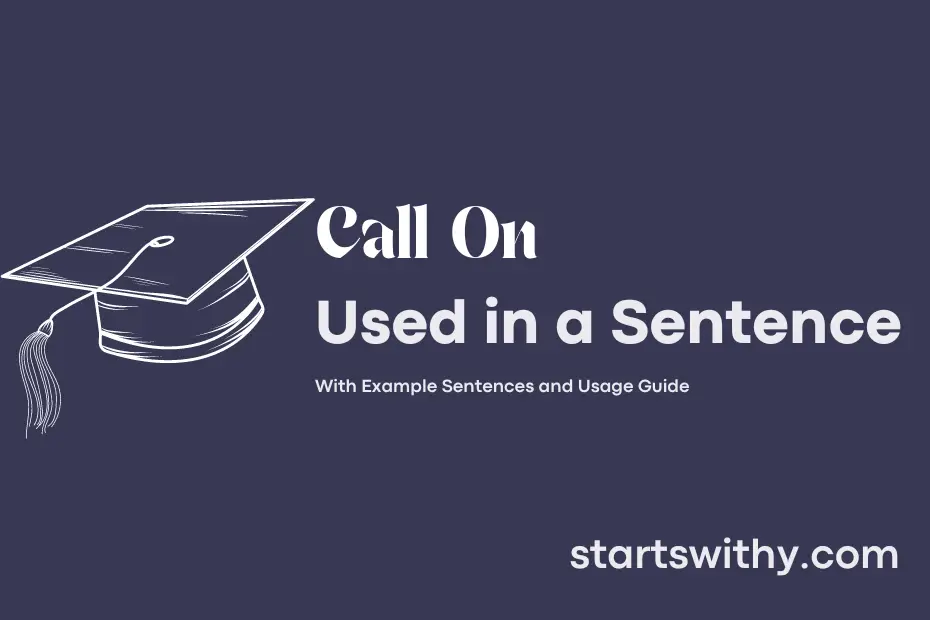“Have you ever been in a situation where you needed to request someone’s input, opinion, or assistance in a group setting? This is where the phrase ‘call on’ comes into play. When you ‘call on’ someone, you are asking them to speak or contribute in a discussion or activity.”
Calling on someone is a common practice in classrooms, meetings, and social gatherings. It not only encourages participation and inclusivity but also allows individuals to share their thoughts and ideas effectively. Let’s explore how this simple phrase can facilitate communication and engagement in various settings.
7 Examples Of Call On Used In a Sentence For Kids
- Call on Anu to answer the question.
- The teacher will call on Rohan to read the poem.
- Call on Meena to share her favorite story.
- Let’s call on Ravi to sing a song for us.
- The principal will call on Nisha to lead the prayer.
- Call on Arjun to show us his drawing.
- It’s your turn to call on Priya to tell us about her weekend.
14 Sentences with Call On Examples
- College students can *call on their professors during office hours for additional help with course material.*
- During group projects, it’s important to evenly distribute tasks and *call on each team member’s strengths.*
- When participating in a debate, it’s essential to *call on credible sources to support your arguments.*
- College students are encouraged to *call on mental health resources available on campus for support during stressful times.*
- To enhance their learning experience, students should not hesitate to *call on peer tutors for assistance.*
- During presentations, it’s common for professors to *call on students to share their insights on the topic.*
- Before exams, students often *call on study groups to review material and quiz each other on key concepts.*
- When facing academic challenges, students should not hesitate to *call on academic advisors for guidance.*
- In extracurricular activities, students can *call on their teammates for support and motivation.*
- To expand their professional network, students should regularly *call on alumni for mentorship and career advice.*
- During internships, students may be *called on to present their findings to the organization’s leadership team.*
- To stay informed about campus events, students can *call on student organizations’ social media pages for updates.*
- When planning events, student leaders often *call on volunteers to help with logistics and coordination.*
- At career fairs, students can *call on recruiters to learn about job opportunities and internships available.*
How To Use Call On in Sentences?
To use Call On in a sentence, you can follow these easy steps:
-
Identify the situation: Determine when you want to use the phrase Call On. It is often used when someone is selected or asked to speak, answer a question, or share their opinion in a group setting.
-
Formulate your sentence: Once you have identified the moment to use Call On, structure your sentence accordingly. For example, “The teacher will call on students to answer the question.”
-
Use the phrase: In your sentence, place Call On before the person who is being requested to speak or answer. For instance, “The professor called on Sarah to present her research project in class.”
-
Punctuation: In English, always ensure proper punctuation when using Call On in a sentence. This includes capitalizing the first letter of the first word in your sentence and putting a period at the end.
-
Practice and observe: To get comfortable with using Call On in a sentence, practice constructing different examples. Pay attention to how others use it in conversations or when speaking publicly.
By following these steps, you can effectively incorporate Call On in your sentences and communicate your message clearly. Remember to be polite and respectful when requesting someone to speak by using this phrase.
Conclusion
Overall, the examples of sentences with “call on” illustrate the use of this phrase to mean asking or requesting someone to do something. Whether it’s calling on someone for assistance, calling on a friend in need, or calling on a student for an answer, the phrase implies a direct request for action or response. It is a versatile expression that can be used in various contexts, from addressing an individual’s skills or abilities to making demands or seeking help.
In essence, “call on” signals a need or expectation for a specific action or contribution from someone. It conveys the idea of invoking a response, whether it be for support, knowledge, or participation. Understanding the nuances of this phrase can help in effective communication and clear expression of intentions when reaching out to others for various purposes.



